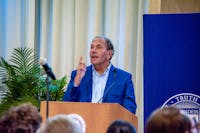Mayhem: 'Healing' the Church will be a difficult task
The Boston Archdiocese's new interim leader, Bishop Richard Lennon, has homegrown appeal -- maybe too much.
With Cardinal Bernard Law's resignation of his archbishopship in December and the subsequent appointment of Bishop Richard Lennon to temporarily head the Boston Archdiocese, "healing" is at the forefront of discussion of the recent sexual abuse scandals in the Roman Catholic Church. But, for most Catholics -- not to mention victims of sexual abuse -- reform and forgiveness are not expected soon. And, for many more, efforts to restore their faith in the religion and confidence in its leaders are too little, too late.Insincerity on the part of Church hierarchy is significantly hampering the so-called healing process. Only last week, a Boston court rejected the archdiocese's claim that separation of church and state should forbid government intervention regarding supervision of clergy. Suffolk Superior Court Judge Constance M. Sweeney rightly acknowledged that such a policy would grant the Church unwarranted immunity against complaints not pertaining to Church doctrine, no matter how severe. Nearly 500 cases alleging that the Church mismanaged priests were at stake in the decision, attesting to a still-callous approach to prevention and upholding victim rights.
It is incumbent on Lennon to take the strong, positive leadership position that Law failed to -- not only to retain membership, but also to establish and promote policy that will prevent further abuse and reinstate Catholics' confidence in parish priests and in the Church hierarchy. An astounding number of Catholics claim the Catholic hierarchy has not taken a strong enough stance toward reform. Attesting to the Church's waning popularity among many of its own members, the National Catholic Reporter noted last week that financial contributions by Catholics are suffering and church attendance is down as much as 20 percent in some U.S. locations.
Lennon was probably a savvy choice to transition the archdiocese as it struggles to turn away from the scandal and turmoil that Catholics hope will subside now that Law is out of the picture. Whereas the Mexican-born Law's until-now distinguished career has spanned the Eastern United States from Mississippi to Massachusetts, Lennon is a homegrown clergyman. Lennon, the son of an Arlington, Mass. firefighter, attended Boston College for two years before transferring to St. John's Seminary in Boston. He has served parishes in Quincy and Scituate and was named auxiliary bishop by Pope John Paul II only last year. It is no secret that Bostonians love their own (think the Red Sox or Patriots), and for this reason, Lennon may garner loyalty that an outside appointee may not.
Lennon's homegrown appeal will flourish only if he can prove that he isn't too much of an insider -- a point on which many critics are skeptical. As an expert on cannon law, Lennon was very much a part of Law's administration. Documents released early this month reveal that he has been active in the case of the Rev. John Picardi, even though Lennon had previously claimed he not been involved in the case. Picardi is still an active priest, despite having confessed to raping a man and having been accused of inappropriately touching a New Jersey girl. In response criticism about Picardi, however, Lennon later stated he had been involved only as an adviser on cannon law and had no decision-making power.
One movement, though, has Church leaders listening -- some with approval and others with disdain. It was the Voices of the Faithful that called for Law's resignation only days before Law gave into criticism by both laity and 58 of his own priests. The group sprang out of a meeting of 25 concerned laypersons in Wellesley and has received significant media coverage following its birth in January 2002. With chapters in 40 states and abroad, the Newton-based group defines itself as " centrist," boasts over 25,000 members and seeks to reform the Church from the inside. Their grassroots efforts have met mixed reactions, with some bishops banning meetings on parish property. One bishop went as far as to call the organization " anti-Catholic" -- an ironic choice of words given the group stresses reform from within the Church's pre-existing hierarchal structure.
The Catholic Church has reached a pivotal historical moment at which action will shape its path for generations to come. But, at this point, it doesn't look good. Unfortunately, inaction still seems to be preferred. For example, the Boston Globe reported last week that Law's portrait now hangs in the archbishop's residence where a painting of the Virgin of Guadalupe once was. The portrait now overlooks Lennon's meetings with visitors, less than subtly reinforcing the Church's reluctance to change.
With Law in the shadows and the Church unwilling to demystify its internal affairs, a call for " healing" is like covering an oozing infection with a Band-Aid; the wound will only grow deeper and more painful over time. But, many faithful Catholics point out that the Church has changed -- recalling the persecution of Galileo, among other misdeeds -- and can change again.
Let's just hope that this time justice doesn't take 350 years.
-- Michaela May '03 submits a column to the Justice.



Please note All comments are eligible for publication in The Justice.